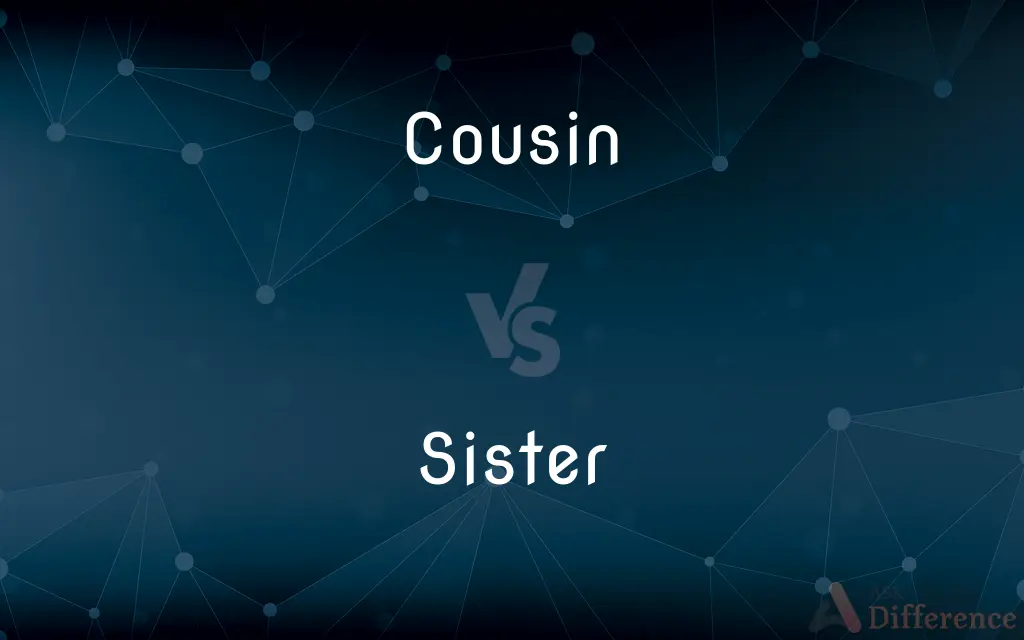Cousin vs. Sister — What's the Difference?
By Urooj Arif & Fiza Rafique — Updated on March 13, 2024
Cousin refers to a family member who shares a common ancestor, typically one or more generations removed, while sister denotes a sibling with the same parents.

Difference Between Cousin and Sister
Table of Contents
ADVERTISEMENT
Key Differences
Cousins are relatives with whom one shares a common ancestor, such as a grandparent, but who are not as closely related as siblings. The degree of cousinship (first, second, etc.) indicates the number of generations between the cousins and their nearest common ancestor. Sisters, however, are immediate family members born to the same parents, offering a closer genetic and often social bond compared to cousins.
While cousins are part of the extended family and can vary widely in terms of age and generational proximity, sisters are part of the nuclear family and typically grow up together, sharing a household and day-to-day experiences. This can lead to stronger emotional bonds and shared childhood memories among sisters than between cousins.
The relationship dynamics can also differ significantly; cousins may see each other infrequently, mainly during family gatherings or special occasions, whereas sisters often have daily interactions, influencing each other's lives more directly. This difference in interaction frequency can affect the depth and nature of the relationship.
Legal and social recognitions of these relationships also vary. Sisterhood implies a direct familial connection with legal implications in matters of inheritance, custody, and other familial rights. Cousin relationships, being one step removed, usually have fewer legal ties and implications.
Cultural perceptions of cousins versus sisters can vary greatly. In some cultures, cousins are considered close relatives and play significant roles in each other's lives, almost akin to siblings. In contrast, sisterhood is universally recognized as a close familial bond, often idealized for its potential for deep companionship and loyalty.
ADVERTISEMENT
Comparison Chart
Relation
Shares a common ancestor like a grandparent
Siblings with the same parents
Bond
Extended family, possibly distant
Immediate family, typically close
Interaction
Often occasional, during family gatherings
Usually daily, growing up together
Legal Implications
Fewer direct legal ties
Direct legal and social implications
Cultural Perception
Varies, generally considered less close
Universally seen as a close familial bond
Compare with Definitions
Cousin
A relative with whom one shares a common ancestor such as a grandparent.
My cousin and I meet at family reunions.
Sister
A female sibling with the same parents.
My sister and I share a room.
Cousin
Part of the extended family, not as closely related as siblings.
I have dozens of cousins from my large extended family.
Sister
Part of the nuclear family, typically forming a close bond from shared experiences.
My sister is my closest confidant.
Cousin
Relationship varies by degree (first, second, etc.) indicating generational distance.
My first cousin's children are my first cousins once removed.
Sister
May be older, younger, or a twin, affecting the familial dynamic.
As the older sister, I often look out for my siblings.
Cousin
Often connects families through marriages and ancestral lineage.
Our cousins on my mother's side live in a different country.
Sister
Relationship imbued with legal and social implications.
My sister is my legal guardian.
Cousin
May have a range of closeness, from very close to barely known.
Though technically cousins, we grew up together like siblings.
Sister
Often signifies a lifelong bond with shared childhood memories.
My sister and I reminisce about our childhood adventures.
Cousin
Commonly, "cousin" refers to a "first cousin", a relative whose most recent common ancestor with the subject is a grandparent. More generally, in the lineal kinship system used in the English-speaking world, a cousin is a type of familial relationship in which two relatives are two or more familial generations away from their most recent common ancestor.
Sister
A sister is a woman or girl who shares one or more parents with another individual. The male counterpart is a brother.
Cousin
A child of one's aunt or uncle. Also called first cousin.
Sister
A female having the same parents as another or one parent in common with another.
Cousin
A relative descended from a common ancestor, such as a grandparent, by two or more steps in a diverging line.
Sister
A kinswoman.
Cousin
A member of a kindred group or country
Our Canadian cousins.
Sister
A woman fellow member, as of a sorority.
Cousin
Something similar in quality or character
"There's no mistaking soca for its distant Jamaican cousin, reggae" (Michael Saunders).
Sister
A fellow woman.
Cousin
Used as a form of address by a sovereign in addressing another sovereign or a high-ranking member of the nobility.
Sister
A close woman friend or companion.
Cousin
The child of a person's uncle or aunt; a first cousin.
I think my cousin is a good man.
Sister
A fellow African American woman or girl.
Cousin
(archaic) A kinsman.
Sister
A woman who advocates, fosters, or takes part in the feminist movement.
Cousin
Any relation who is not a direct ancestor or descendant but part of one's extended family; one more distantly related than an uncle, aunt, granduncle, grandaunt, nephew, niece, grandnephew, grandniece, etc.
Sister
(Informal) Used as a form of address for a woman or girl.
Cousin
(obsolete) A title formerly given by a king to a nobleman, particularly to those of the council. In English writs, etc., issued by the crown, it signifies any earl.
Sister
A member of a religious order of women; a nun.
Cousin
(figurative) Something kindred or related to something else.
Sister
Used as a form of address for such a woman, alone or followed by the woman's name.
Cousin
A member of the British intelligence services (from an American perspective) or of the American intelligence services (from a British perspective).
Sister
Chiefly British A nurse, especially the head nurse in a ward.
Cousin
One collaterally related more remotely than a brother or sister; especially, the son or daughter of an uncle or aunt.
Thou art, great lord, my father's sister's son,A cousin-german to great Priam's seed.
Sister
One identified as female and closely related to another
“the sisters Death and Night” (Walt Whitman).
Cousin
A title formerly given by a king to a nobleman, particularly to those of the council. In English writs, etc., issued by the crown, it signifies any earl.
My noble lords and cousins, all, good morrow.
Sister
(Architecture) A beam or other structural member affixed to another as a supplementary support.
Cousin
Allied; akin.
Sister
Related by or as if by sisterhood; closely related
Sister ships.
Sister cities.
Cousin
The child of your aunt or uncle
Sister
(Genetics) Of or being one of an identical, related, or homologous pair
Sister chromatids.
Sister
(Architecture) To affix a beam or other structural member to (another) as a supplementary support.
Sister
A daughter of the same parents as another person; a female sibling.
My sister is always driving me crazy.
Sister
A female member of a religious order; especially one devoted to more active service; (informally) a nun.
Michelle left behind her bank job and became a sister at the local convent.
Sister
Any butterfly in the genus Adelpha, so named for the resemblance of the dark-colored wings to the black habit traditionally worn by nuns.
Sister
(British) A senior or supervisory nurse, often in a hospital.
Sister
Any woman or girl with whom a bond is felt through common membership in a community, race, profession, religion, organization, or ism.
Connie was very close to her friend Judy and considered her to be her sister.
Sister
A black woman.
Sister
(informal) A form of address to a woman.
What’s up, sister?
Sister
A woman, in certain religious, labour or socialist circles; also as a form of address.
Thank you, sister. I would like to thank the sister who just spoke.
Sister
(attributively) An entity that has a special or affectionate, non-hierarchical relationship with another.
Sister publication
Sister city
Sister projects
Sister
(comptheory) A node in a data structure that shares its parent with another node.
Sister
Something in the same class.
Sister ships
Sister facility
Sister
To strengthen (a supporting beam) by fastening a second beam alongside it.
I’m trying to correct my sagging floor by sistering the joists.
Sister
To be sister to; to resemble closely.
Sister
A female who has the same parents with another person, or who has one of them only. In the latter case, she is more definitely called a half sister. The correlative of brother.
I am the sister of one Claudio.
Sister
A woman who is closely allied to, or assocciated with, another person, as in the sdame faith, society, order, or community.
Sister
One of the same kind, or of the same condition; - generally used adjectively; as, sister fruits.
Sister
To be sister to; to resemble closely.
Sister
A female person who has the same parents as another person;
My sister married a musician
Sister
(Roman Catholic Church) a title given to a nun (and used as a form of address);
The Sisters taught her to love God
Sister
A female person who is a fellow member of a sorority or labor union or other group;
None of her sisters would betray her
Sister
Sometimes used as a term of address for attractive young women
Common Curiosities
Can cousins be as close as sisters?
While cousins are typically considered less close than sisters, the closeness of any relationship can vary greatly based on individual circumstances and family dynamics.
What is a cousin?
A cousin is a relative with whom one shares a common ancestor, such as a grandparent, but is not a direct sibling.
Can the relationship with a cousin be legally recognized?
While cousin relationships are recognized, they typically have fewer legal rights and obligations associated with them compared to sibling relationships.
Are there different types of cousins?
Yes, cousins can be first, second, third, etc., indicating the number of generations between them and their nearest common ancestor.
What defines a sister relationship?
A sister relationship is defined by two female siblings having the same parents and often includes a close bond formed by growing up together.
Do cultural perceptions of cousins and sisters vary?
Yes, cultural perceptions can vary significantly, with some cultures placing a strong emphasis on extended family, including cousins, while others focus more on the nuclear family, including sisters.
What role do sisters typically play in a family dynamic?
Sisters often play significant roles in family dynamics, providing emotional support, companionship, and sometimes even caretaking roles within the family.
Can sisters have a professional or legal responsibility towards each other?
Yes, in certain circumstances, sisters may have legal responsibilities towards each other, such as in guardianship or healthcare decisions.
Are cousin relationships acknowledged in all cultures?
While most cultures acknowledge cousin relationships, the importance and closeness ascribed to these relationships can vary widely.
How does the legal significance of sisters compare to that of cousins?
Sister relationships have more direct legal implications, such as in inheritance or custody matters, compared to cousin relationships.
How does a cousin differ from a sister?
Cousins are part of the extended family with a more distant common ancestry, while sisters are immediate family members with the same parents.
How do cousin relationships influence family gatherings?
Cousins can add to the richness of family gatherings, providing connections across branches of the family tree and contributing to a sense of extended family unity.
How do family traditions affect relationships with cousins and sisters?
Family traditions can strengthen bonds with both cousins and sisters, creating shared memories and reinforcing familial connections.
Is it common for cousins to grow up together like siblings?
In some families and cultures, cousins do grow up closely and may develop sibling-like relationships, though this is not universally the case.
What impact do sisters have on each other's personal development?
Sisters can significantly impact each other's personal development through shared experiences, emotional support, and role modeling.
Share Your Discovery

Previous Comparison
Recede vs. Receed
Next Comparison
Sporf vs. SporkAuthor Spotlight
Written by
Urooj ArifUrooj is a skilled content writer at Ask Difference, known for her exceptional ability to simplify complex topics into engaging and informative content. With a passion for research and a flair for clear, concise writing, she consistently delivers articles that resonate with our diverse audience.
Co-written by
Fiza RafiqueFiza Rafique is a skilled content writer at AskDifference.com, where she meticulously refines and enhances written pieces. Drawing from her vast editorial expertise, Fiza ensures clarity, accuracy, and precision in every article. Passionate about language, she continually seeks to elevate the quality of content for readers worldwide.















































